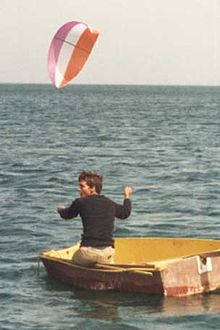Kiteboating

Kiteboating or kite boating is the act of using a kite rig as a power source to propel a boat. Kiteboating is a type of surface water sport, but it also has transportation uses[1]
Equipment
[edit]Kiteboating uses different types of gear from kitesurfing. Kites attached to boats can be larger than kites attached to a surfer. For long voyages, the kite rig must be more autonomously controlled. Due to the lifting power of kites, they are often used with hydrofoils.[2]

Current kite rigs can be sailed within 50 degrees of the wind.[1] Placing turbines in the boat's hull can let the kite power generate electricity on board.[3]
History
[edit]Going back to 1800s, George Pocock used the kites in order to increase the size of propel carts that are found in land and boats.[citation needed] Sébastien Cattelan is the French kitesurfer was the first sailor who was able to break 50 knots, achieving 50.26 knots on 3 October 2008 at the Lüderitz Speed Challenge in Namibia.[4] Next, on 14 November 2009, Alex Caizergues achieved a speed of 50.98 knots in Namibia.[citation needed]
Patents
[edit]- US Patent 6003457 Boat powered by means of a kite via a hinged arm by Pierre Chatelain. Filed:1 April 1998.
See also
[edit]References
[edit]- ^ a b Skysails, Captain John Konrad, Mariners Weather Log, April 2009, Volume 53, No. 1, National Weather Service
- ^ The Kiteboat Project, interview of Don Montague by Paul Lang, The Kiteboarder, 14 December 2012.
- ^ "Home". energykitesystems.net.
- ^ "New World Speed Record 50.26 knots". sail-world.com. 4 October 2008. Retrieved 10 February 2017.
External links
[edit]- Kiteboating enthusiast website
- Kitetender
- Oceankiteboat
- Beginners kiteboating
- Wingit kiteboat systems

